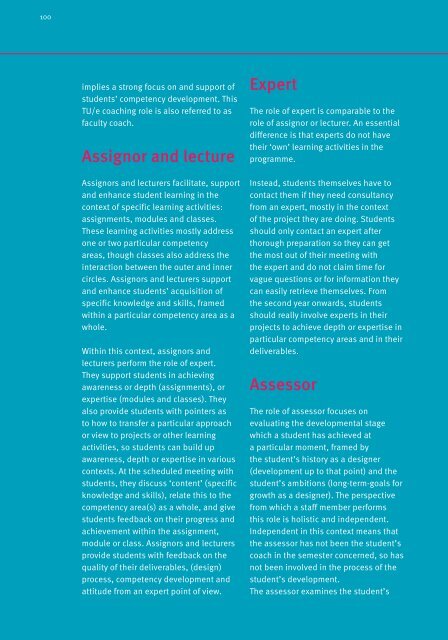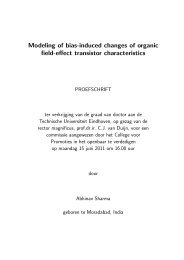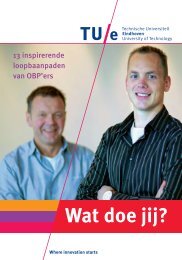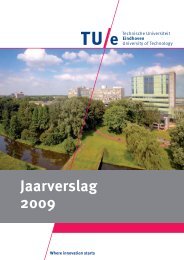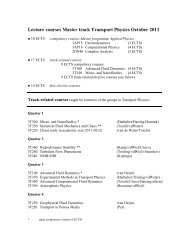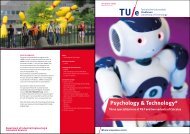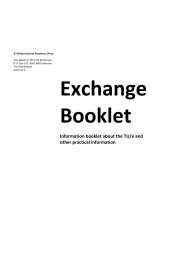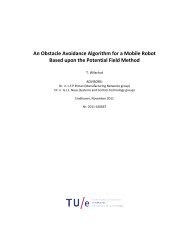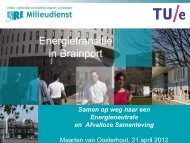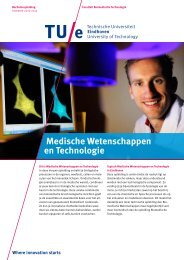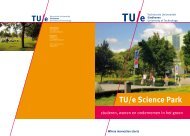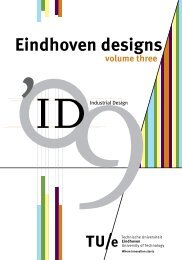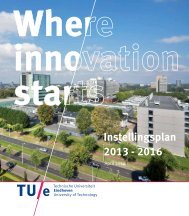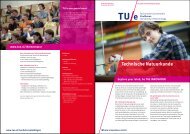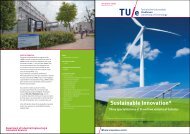Education guide 'Eindhoven designs' - Technische Universiteit ...
Education guide 'Eindhoven designs' - Technische Universiteit ...
Education guide 'Eindhoven designs' - Technische Universiteit ...
You also want an ePaper? Increase the reach of your titles
YUMPU automatically turns print PDFs into web optimized ePapers that Google loves.
100<br />
implies a strong focus on and support of<br />
students’ competency development. This<br />
TU/e coaching role is also referred to as<br />
faculty coach.<br />
Assignor and lecture<br />
Assignors and lecturers facilitate, support<br />
and enhance student learning in the<br />
context of specific learning activities:<br />
assignments, modules and classes.<br />
These learning activities mostly address<br />
one or two particular competency<br />
areas, though classes also address the<br />
interaction between the outer and inner<br />
circles. Assignors and lecturers support<br />
and enhance students’ acquisition of<br />
specific knowledge and skills, framed<br />
within a particular competency area as a<br />
whole.<br />
Within this context, assignors and<br />
lecturers perform the role of expert.<br />
They support students in achieving<br />
awareness or depth (assignments), or<br />
expertise (modules and classes). They<br />
also provide students with pointers as<br />
to how to transfer a particular approach<br />
or view to projects or other learning<br />
activities, so students can build up<br />
awareness, depth or expertise in various<br />
contexts. At the scheduled meeting with<br />
students, they discuss ‘content’ (specific<br />
knowledge and skills), relate this to the<br />
competency area(s) as a whole, and give<br />
students feedback on their progress and<br />
achievement within the assignment,<br />
module or class. Assignors and lecturers<br />
provide students with feedback on the<br />
quality of their deliverables, (design)<br />
process, competency development and<br />
attitude from an expert point of view.<br />
Expert<br />
The role of expert is comparable to the<br />
role of assignor or lecturer. An essential<br />
difference is that experts do not have<br />
their ‘own’ learning activities in the<br />
programme.<br />
Instead, students themselves have to<br />
contact them if they need consultancy<br />
from an expert, mostly in the context<br />
of the project they are doing. Students<br />
should only contact an expert after<br />
thorough preparation so they can get<br />
the most out of their meeting with<br />
the expert and do not claim time for<br />
vague questions or for information they<br />
can easily retrieve themselves. From<br />
the second year onwards, students<br />
should really involve experts in their<br />
projects to achieve depth or expertise in<br />
particular competency areas and in their<br />
deliverables.<br />
Assessor<br />
The role of assessor focuses on<br />
evaluating the developmental stage<br />
which a student has achieved at<br />
a particular moment, framed by<br />
the student’s history as a designer<br />
(development up to that point) and the<br />
student’s ambitions (long-term-goals for<br />
growth as a designer). The perspective<br />
from which a staff member performs<br />
this role is holistic and independent.<br />
Independent in this context means that<br />
the assessor has not been the student’s<br />
coach in the semester concerned, so has<br />
not been involved in the process of the<br />
student’s development.<br />
The assessor examines the student’s


